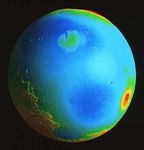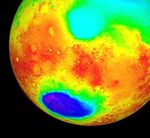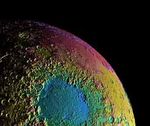THE TEN BIGGEST IMPACT CRATERS IN THE SOLAR SYSTEM
←
→
Page content transcription
If your browser does not render page correctly, please read the page content below
Feature Story 1260
THE TEN BIGGEST IMPACT CRATERS IN
THE SOLAR SYSTEM
I
t was one of the greatest natural
disasters in the Earth’s history.
Sixty-five million years ago, a
piece of space rock nearly 15 kilome-
tres in diameter hit the Earth with a
force equivalent to a billion atomic
bombs. This impact, on an area of
Mexico’s Yucatan Peninsula called
Chicxulub, caused the extinction of
the dinosaurs and wiped out half the
species on the planet. But, believe
it or not, the Earth was lucky. All
over the solar system, the surfaces of
planets and moons bear the evidence
of impacts far bigger than the one at
Chicxulub. If any of these ‘impactors’
hit Earth, the consequences would
be catastrophic. These are the ten
biggest known impact craters in the
solar system:Science Photo Library Feature Stories - Ten Biggest Impact Craters in the Solar System 1. Borealis Basin, Mars Mars holds many records in the solar system. It has the biggest volcano, the biggest canyon system and quite possibly, the biggest crater. Scientists in the 1970’s study- 2. Valhalla, Callisto on the thin surface crust of the moon. Scientists ing the Viking spacecraft images of Mars were perplexed The Jovian moon Callisto is a huge chunk of think this could mean the crust covers a soft or as to why the planet was divided into two halves. The up- rock and ice that is one of the most heavily liquid ocean underneath. The outermost ring per third hemisphere of Mars appeared very smooth and cratered satellites of any planet. Valhalla, its is 2,000 kilometres from the centre and is big low in altitude while most of the southern hemisphere biggest impact basin, consists of a bright patch enough to fit the whole of the USA within its was several kilometres higher, scarred with rough terrain roughly 600 kilometres in diameter, and a series boundaries. and pitted with craters. The two-half planet remained a of concentric rings that spread out beyond the mystery until new data, provided by Mars Reconnaissance centre for thousands of kilometres. The rings Orbiter and Mars Global Surveyor, indicated that the were formed when the impact caused fracturing northern hemisphere’s 8,500-kilometre diameter Borealis Basin could actually be a huge 4 billion-year-old impact crater. The object that created this impact was probably around 2,000 kilometres in diameter – that’s the same size as the planet Pluto.
Science Photo Library Feature Stories - Ten Biggest Impact Craters in the Solar System
4. Hellas Basin, Mars
At over 2,100 kilometres in diameter and nine
kilometres deep, the Hellas Basin on the south-
ern hemisphere of Mars is very big, and very
deep. You could fit all the countries of western
Europe inside its basin. The crater walls are very
steep and the huge amount of material ejected
by the impact stretches out for 4,000 kilometres
from the basin centre and is up to 2 kilometres
thick in places.
3. South Pole-Aitken Ba- Subsequent spacecraft have con-
firmed that a huge impact basin,
sin, Moon. 2,500 kilometres in diameter
Thank goodness for the Moon. Not
and 13 kilometres deep, exists
only does our shiny satellite light
between the south pole and the
up our night sky, shift our ocean
large Aitken crater.
tides and fill our folklore with
The impact occurred very early
moon-related tales, but also, for
in the existence of the moon,
the many hundreds of thousands
some 3.8 billion years ago and
of impacts it has taken instead of
the object that made it was so big
the Earth.
that it would easily have smashed
Many lunar craters are visible to
the Moon apart were it not for the
the naked eye but no one knew
fact that it hit at quite a low angle
about the monster that existed on
– the equivalent to a heavyweight
the far side of the moon until a
boxer’s glancing blow to the head!
small Russian probe, called Luna
3, visited during the early 1960’s
and sent some intriguing images.Science Photo Library Feature Stories - Ten Biggest Impact Craters in the Solar System
monstrous crater, 1,550 kilometres in diam- much more blanketed the surrounding area with ejecta
eter, which, due to its small size, affected common. for over 800 kilometres.
the entire planet . The impact that created
the Caloris Basin caused massive amounts
of lava to flow across the impact basin. The 9. Mare 10. Turgis, Iapetus
force of the impact itself pushed the crust The Saturnian moon Iapetus measures just
upwards, creating a ring of mountains two
Imbrium,
1,500 kilometres in diameter. One half of
kilometres high that surround the crater. Moon the moon is covered with dark ejecta giv-
Shock waves from the impact caused a Ancient sky
ing it a two-tone appearance. Dominating
second set of outer mountains to rise up gazers once
the ‘light’ side of the moon is the Turgis
from the crust and even affect geological thought that
impact crater. Although the crater meas-
processes on the other side of the planet. the dark
ures only 580 kilometres wide, it comprises
5. Argyre Basin, Mars patches on
40 percent of the diameter of the whole
Coming a close second to Hellas in terms the surface
of Iapetus. This is easily one of the biggest
of size, is the massive Argyre Basin, also of the moon
on the southern hemisphere of Mars. At
7. Isidis Planitia, Mars craters as a proportion of the diameter and
were vast oceans. Mare Imbrium is the
Isidis is Mars’ third, officially recognised, hence makes our top ten – and it looks very
1,800 kilometres wide and 5 kilometres largest of these patches and is easily visible
biggest crater. With a diameter of around pretty too.
deep is closely rivals it’s giant crater but to the naked eye. If the Moon were a clock
1,500 kilometres, the vast sand-covered
the two are on different sides of the red face, Mare Imbrium could be described
basin was chosen as the landing site of the
globe. Argyre does have one novel feature as a roughly circular patch sitting around
ill-fated Beagle 2 spacecraft. The British-
of interest – a smiley crater! 11 O’clock on the moon’s face. The basin
built Beagle 2 was released from ESA’s
measures 1,100 kilometres in diameter
Mars Express spacecraft in December 2003.
and its dark appearance is due, not to a
After separation, Beagle 2 was never heard
6. Caloris, from again. The huge basins of Mars may
liquid ocean, but was formed when lava
fluid flooded the hole that was made by
Mercury once have contained liquid oceans of water
the impact.
It was the and Beagle 2 was meant to find evidence
And what a
space probe of water, and possibly life.
colossal impact
Mariner 10,
it must have
in 1974, that
been. Surround-
first discov- 8. Asgard, Callisto ing the Mare
ered some- Valhalla is not the only big impact on Cal- crater are three
thing huge listo. The rings of Asgard span over 1,400 rings of moun-
lurking on kilometres in diameter. It too has a bright tains, some
the surface of central zone, which measures 300 kilome- rise as high as
our smallest planetary neighbour Mercury. tres wide. Like Valhalla, the Asgard impact seven kilome-
In 2008, the Messenger spacecraft went happened a long time in the past, possibly tres above the Mare surface. The impact
back and examined Mercury. It confirmed a several billion years ago when impacts were gouged a hole five kilometres deep andScience Photo Library Feature Stories - Ten Biggest Impact Craters in the Solar System Impacts on Earth impact crater in South Africa. There are also sug- The Chicxulub impact that killed off the dinosaurs gestions that the East Antarctic ice sheet hides 65 million years ago seems like a small dent a 482-kilometre impact crater. Some researchers compared to the monstrous impacts found on believe this impact may have been the cause of other solar system bodies. Chicxulub is actually the great Permian-Triassic extinction 250-million one of over 170 terrestrial impact craters that are years ago. officially recognised by the Earth Impact Database Most impacts that occurred further back in time – an online catalogue of impact craters with strict have long since become eroded away or eaten up criteria. as part of the Earth’s continual geological proc- Some impacts, such as the Barringer crater in esses. But it was highly likely that in the earliest Arizona, or Wolf Creek crater in Australia are history of the Earth, our planet was bombarded easily visible, having formed within the past with objects as big as those that have fallen on few hundred thousand years. Most other craters Mars, the Moon, Callisto etc.. The truly frightening however are hidden under deep layers of sedi- aspect, is that a monster impact may yet hit us in ment, rock, water, or vegetation. Satellites that the very near future. And there is nothing we can measure anomalies in the surface gravity are able do to stop it. to spot many hidden craters, such as those lying in Chicxulub and Chesapeake Bay. The largest crater ENDS 1,400 WORDS © 2010 COPYRIGHT SCI- on Earth that is officially recognised by the Earth ENCE PHOTO LIBRARY Impact Database, is the 300 kilometre Vredefort
Science Photo Library Feature Stories - Ten Biggest Impact Craters in the Solar System FULL PICTURE SET For captions and credits, please refer to the captions.txt file For further information, please contact: seymour@sciencephoto.com All images are copyright, please credit images as stated on the captions
Science Photo Library Feature Stories - Ten Biggest Impact Craters in the Solar System FULL PICTURE SET For captions and credits, please refer to the captions.txt file For further information, please contact: seymour@sciencephoto.com All images are copyright, please credit images as stated on the captions
You can also read



























































